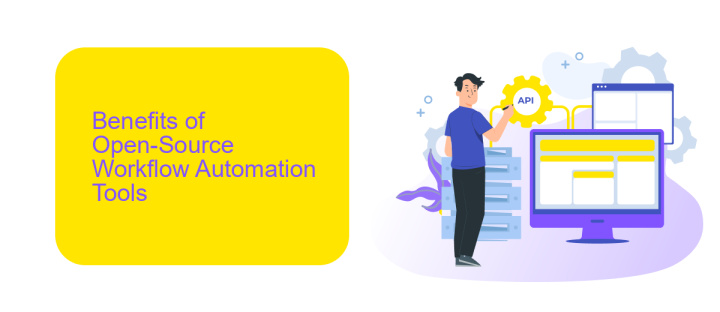Workflow Automation Tool Open Source
In today's fast-paced business environment, efficiency and productivity are paramount. Open-source workflow automation tools offer a powerful solution to streamline operations, reduce manual tasks, and enhance collaboration. These tools provide customizable, cost-effective options for businesses of all sizes, enabling teams to focus on strategic activities rather than repetitive processes. Discover the benefits and potential of integrating open-source workflow automation into your organization.
Introduction
Workflow automation tools have become indispensable in modern business environments, enabling organizations to streamline operations, reduce manual tasks, and enhance productivity. Open source solutions offer the added benefits of customization, flexibility, and cost-efficiency, making them an attractive option for businesses of all sizes.
- Cost-effectiveness: Open source tools eliminate licensing fees, reducing overall expenses.
- Customization: Source code availability allows for tailored solutions to meet specific needs.
- Community Support: Active communities contribute to continuous improvement and troubleshooting.
- Integration: Tools like ApiX-Drive facilitate seamless integration with various applications and services.
As businesses seek to automate their workflows, open source tools provide a robust and adaptable framework. Whether it's integrating different software platforms or automating repetitive tasks, these tools offer a scalable solution. ApiX-Drive, for instance, simplifies the integration process, enabling businesses to connect multiple applications effortlessly, thus enhancing overall efficiency and productivity.
Benefits of Open-Source Workflow Automation Tools

Open-source workflow automation tools offer numerous benefits, making them a compelling choice for businesses of all sizes. One of the primary advantages is cost-efficiency. Since these tools are open-source, they are usually free to use, eliminating the need for expensive licensing fees. This allows organizations to allocate their budget to other critical areas. Additionally, the open-source nature means that the community continuously improves and updates the software, ensuring it remains robust and secure over time.
Another significant benefit is flexibility and customization. Open-source tools can be tailored to meet specific business needs, allowing for more efficient and effective workflow management. For instance, services like ApiX-Drive can be integrated seamlessly with open-source automation tools to streamline various business processes. ApiX-Drive facilitates the connection between different applications and services, automating data transfer and reducing manual effort. This enhances overall productivity and ensures that all systems work in harmony, providing a cohesive and efficient operational environment.
Popular Open-Source Workflow Automation Tools

Open-source workflow automation tools have gained significant popularity due to their flexibility, cost-effectiveness, and community-driven development. These tools enable businesses to streamline processes, improve productivity, and reduce manual errors by automating repetitive tasks.
- Apache Airflow: A powerful platform to programmatically author, schedule, and monitor workflows. It is highly extensible and integrates easily with various data sources.
- n8n: This tool offers a fair-code licensed workflow automation solution. It allows users to connect various apps and APIs without extensive coding knowledge.
- Node-RED: A flow-based development tool for visual programming, ideal for connecting hardware devices, APIs, and online services.
- ApiX-Drive: Specializes in setting up integrations between different services and applications. It simplifies the process of connecting various systems, making workflow automation seamless.
- Camunda: An open-source platform for workflow and decision automation. It provides robust support for BPMN and DMN standards.
These tools empower organizations to build custom workflows tailored to their specific needs. By leveraging open-source solutions like Apache Airflow, n8n, Node-RED, ApiX-Drive, and Camunda, businesses can achieve greater efficiency and innovation in their operations.
Comparison of Open-Source Workflow Automation Tools

When it comes to selecting an open-source workflow automation tool, the options can be overwhelming. Each tool offers unique features and capabilities, making it essential to understand their differences to choose the right one for your needs.
Open-source tools provide flexibility and customization options, but they also come with varying levels of complexity and community support. Here, we compare some of the most popular open-source workflow automation tools to help you make an informed decision.
- Apache Airflow: Known for its robust scheduling and monitoring capabilities, ideal for complex workflows.
- n8n: Offers a user-friendly interface and supports a wide range of integrations, making it suitable for non-developers.
- Camunda: Provides a strong focus on BPMN standards and is excellent for business process management.
- ApiX-Drive: Specializes in setting up integrations between various services with minimal effort, streamlining your workflow automation.
Each of these tools has its strengths and weaknesses. Apache Airflow is great for technical users who need advanced scheduling, while n8n is perfect for those who prefer a more intuitive interface. Camunda excels in business process management, and ApiX-Drive simplifies integration setup. Consider your specific requirements to choose the best tool for your workflow automation needs.
Conclusion
In conclusion, adopting an open-source workflow automation tool can significantly enhance operational efficiency and reduce manual errors. These tools provide the flexibility and customization options that proprietary solutions often lack, allowing organizations to tailor workflows to their specific needs. Moreover, the collaborative nature of open-source projects fosters continuous improvement and innovation, ensuring that the tools evolve in response to user feedback and emerging trends.
Integrating various applications and services is crucial for a seamless workflow, and tools like ApiX-Drive offer robust solutions for setting up these integrations effortlessly. By leveraging such services, businesses can automate data transfers between different platforms, ensuring that information flows smoothly and tasks are executed without delays. Ultimately, the strategic implementation of open-source workflow automation tools empowers organizations to streamline processes, enhance productivity, and achieve greater agility in today's competitive landscape.
FAQ
What is a workflow automation tool?
How can I integrate different applications using an open-source workflow automation tool?
Is it difficult to set up an open-source workflow automation tool?
Can I use an open-source workflow automation tool for my small business?
What kind of support is available for open-source workflow automation tools?
Apix-Drive will help optimize business processes, save you from a lot of routine tasks and unnecessary costs for automation, attracting additional specialists. Try setting up a free test connection with ApiX-Drive and see for yourself. Now you have to think about where to invest the freed time and money!

